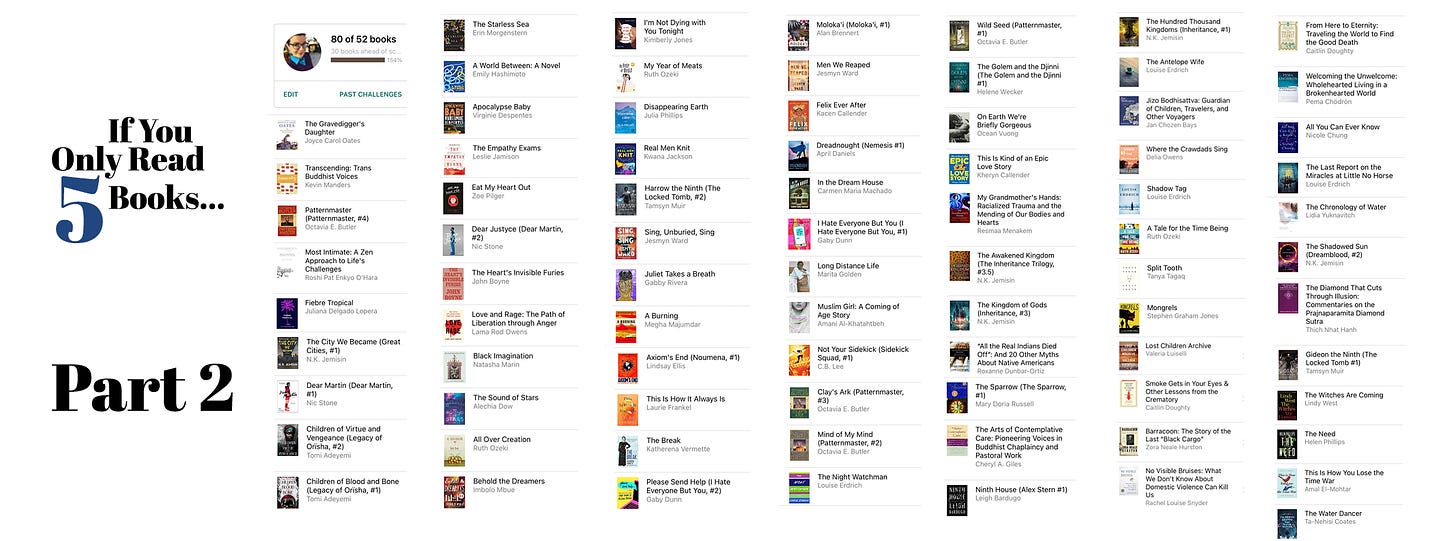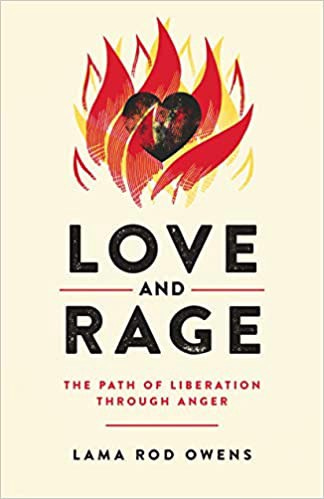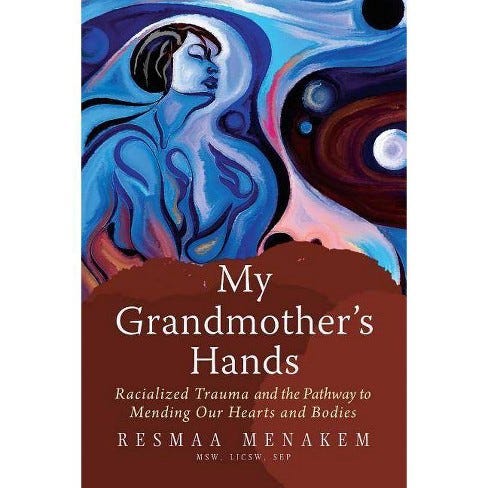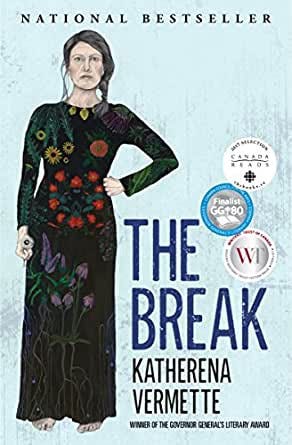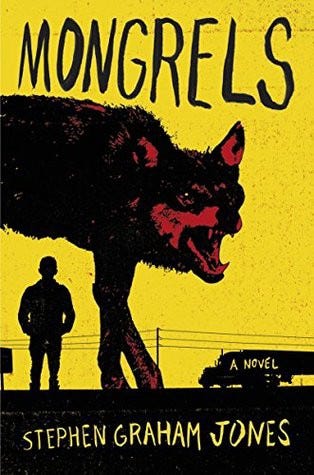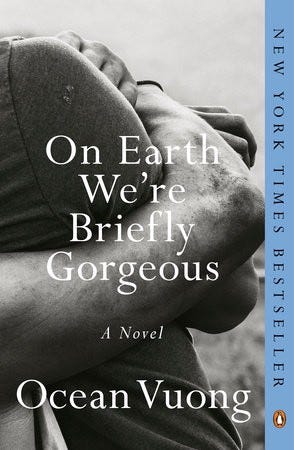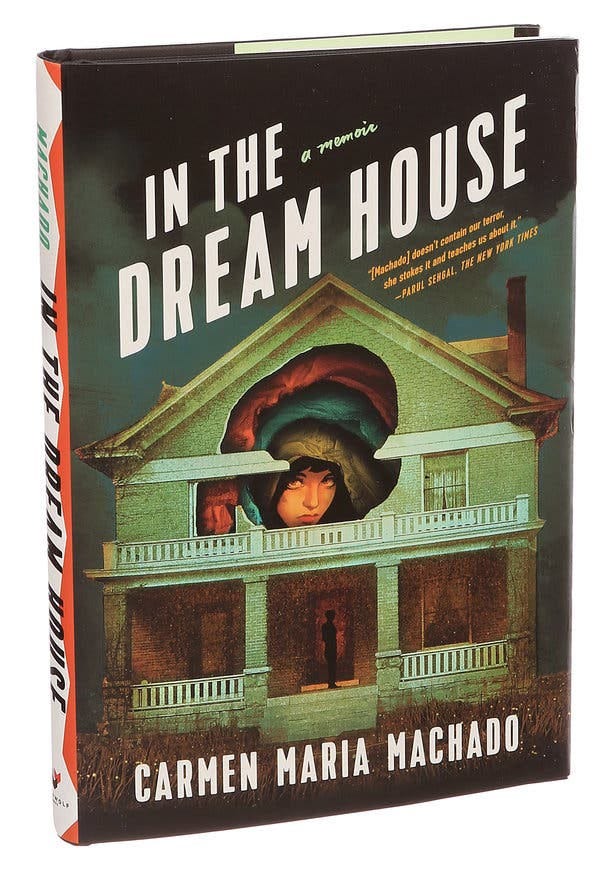Pt. 2 - If You Only Read 5 Books in 2021…
Part 2 — Books to educate, galvanize & build resilience
Part 2 — Books to educate, galvanize & build resilience
The second half of my book recommendation blog post for 2021 is all about books that can help build resilience and grow your intersectional awareness. These are six books that take voices from the margins, offer validating narratives, and generally helped me feel community connection throughout the months of isolation.
Non-Fiction
Love & Rage: The path of liberation through anger–Lama Rod Owens
I have been awaiting a book by Lama Rod Owens ever since his debut in the collaborative book Radical Dharma. The timing on the release of this book felt like more than a coincidence. It came out mid-June, as the movement for Black lives was spreading well outside the United States and people were taking their love and rage to the streets en masse. Unable to attend protests for health reasons, I was doing all I could to support protesters, amplify the voices of organizers, and contribute financially. It was frustrating though, to not be in a position where I could safely go stand shoulder to shoulder with others in the streets. When this book came out, it was like being gifted the community connection I was craving — a reminder that there is a role for everyone on the path of liberation and every role matters, alongside strong emotions.
This book is part call to action and part call to rest. Part validation and part galvanization. The strength and consistency of Lama Rod’s practice are on every single page. He brings queerness, Blackness, masculinity and femininity together and teaches a Dharma relevant to this historical moment and fully informed by the lineage of ancestors who came before.
I realise that reading non-fiction is not for everyone — I didn’t start reading non-fiction by choice until I was twenty-three — so I always try to offer up alternative ways to engage with the content available in these suggestions. In the case of Lama Rod, there is no shortage of ways you can learn from him. First off, following him on Instagram is a great way to get a taste of his style and get little snippets from this book. You can listen to the episode of Everything is Workable he joined in collaborating on back in 2017 and visit his website to find recordings of his talks. Lama Rod is also the co-founder of Bhumisparsha, a newly formed dharma community with an abundance of online offerings.
My Grandmother’s Hands: Racialized Trauma and the Pathway to Mending Our Hearts and Bodies—Resmaa Menakem
Ever since this book came out people have been asking me if I’ve read it. It was little surprise then, when I picked it up, to find Resmaa Menakem’s teachings resonating with me. “No wonder people were asking if I’d read this!” I thought, “I’ve said some of this stuff before!”
Resmaa Menakem’s embodied approach to understanding racism is like an echo of what I’ve learned from Dharma teachers like Zenju Earthlyn Manuel and Reverend angel Kyodo williams. The difference is that he takes a secular approach informed by his training as a therapist and social worker, rather than as a spiritual teacher. Which is not to say this book isn’t incredibly spiritual.
I appreciate how he has written this book like a conversation you must participate in as a reader. He knows how likely folks are to skip over the practices and he says as much. He knows that this is in an American context and informed by his experience as a Black man but still invites the reader to use the practices to explore their own cultural context. He knows that anti-racism work is non-conclusive as long as racist systems continue to function and he sets the tone for the reader to cultivate whatever resiliency is needed to stay in the work.
2020 was a year of Resmaa Menakem content including two interviews on OnBeing with Krista Tippett, a Fireside Chat with Reverend angel, and a conversation with Tara Brach, just for starters. You can learn more about his work in the world on his website.
Fiction
The Break—Katherena Vermette
In 2019 at the book signing for the youth version of An Indigenous People’s History of the United States, Roxanne Dunbar-Ortiz suggested I look up the graphic novel A Girl Called Echo. When my friend suggested I read The Break, I quickly discovered it was by the same author of that graphic novel I’d gotten out of the library months before.
This book is deeply moving and almost poetic in parts. Vermette stitches together a narrative that explores the ongoing impact of intergenerational trauma and colonialism within families and larger community networks. It is as much a reclamation of agency as it is a declaration of how colonialism continues to function in our modern world.
Mongrels—Stephen Graham Jones
I have never been one to read horror fantasy with vampires or werewolves — it’s just not my thing — but this book kept popping up in recommendations and so I went for it. Stephen Graham Jones himself says he wrote this because he was tired of how stories about supernatural beings assumed a level of wealth and prestige. What happens if the myth of the werewolf is combined with the cultural myths of poverty and the social myths of racial inferiority? Mongrels is what happens. At times it’s hard to tell what is a metaphor and what is not in this book that entirely subverts expectations.
Memoir (ish)
On Earth We’re Briefly Gorgeous—Ocean Vuong
I titled this category “memoir-ish” because On Earth We’re Briefly Gorgeous is listed as a novel, not a memoir, but generally recognized as being autobiographical. Ocean Vuong is a poet first and it shows. The language of this book is absolutely delicious even as it explores an abusive parent/child relationship, internalized homophobia, and racism. Vuong gives us a coming of age story rich with the complexity of being human and the intersections of race, sexuality, and culture. If you enjoyed Heart Berries by Terese Marie Mailhot, you will surely enjoy Vuong’s debut novel.
In The Dream House—Carmen Maria Machado
This American Life featured one chapter from this book, read by Zoë Winters, and I knew I had to buy it. Listening to Zoë read what Carmen Maria Machado had written was both validating and terrifying — the details were different but the feeling captured is exactly how it was when I was in an emotionally and mentally abusive relationship.
So I order the book and proceeded to not read it because part of me was afraid that it was going to be just a little too close for comfort. When I finally did sit down to it, I could not put it down. I read it over a weekend, marveling in how amazing it felt to be reflected on those pages. It was like being seen in a way I rarely am, given how uncomfortable we are a society with addressing abuse at all, let alone abuse in queer relationships. My gratitude for Machado writing this cannot be expressed. I’m including this for anyone who is a survivor of an abusive relationship but especially if you are AFAB1 and your abuser was also AFAB. I’m including this for anyone who has struggled to tell the story of what happened and how. I am including this because we need to share these stories as a reminder that we are not the only ones and there is a path to healing.
There you go! Twelve books and three authors for you to choose from in 2021! As usual this year I will be reading like a fiend, and when I have the energy and inclination I’ll publish a Secret Librarian review. You can keep up with these by following me on Instagram, where you are always welcome to DM requests for book suggestions.
May you be held in community, get the nourishment you need, and find ways to thrive in 2021.
Assigned Female At Birth, as opposed to Assigned Male At Birth. Oh, for a future when we are a heck tonne less obsessed with genitals.



